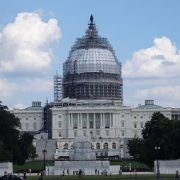News Roundup: U.S. Senate Approves Driverless Car Bill, Federal Government Gives State Millions For Automated Taxi Service, and More
Jennifer van der Kleut
Driverless car bill passes in the U.S. Senate
Members of the U.S. Senate on Wednesday approved a bill similar to one already passed in the House of Representatives that will presumably help clear the way for driverless car technology to move forward. The bill keeps approval of driver’s licenses, regulation of insurance and enforcement of traffic laws within the states’ purview, but places oversight of the design and manufacture of driverless vehicles in the hands of the federal government-specifically the National Highway Traffic Safety Administration (NHTSA). Like the House bill, the Senate bill also permits Transportation Secretary Elaine Chao to hand individual auto manufacturers exemptions from federal safety standards for up to 100,000 vehicles per year while they are fine-tuning their technology; and it also places responsibility with tech designers to protect their vehicles from cyber attacks. Read more from the Washington Post.
Federal government giving South Carolina county millions for driverless taxis?
According to a news report from a USA Today-affiliated regional newspaper, the federal government has pledged millions of dollars toward the development of a driverless taxi service in Greenville, South Carolina. Greenville Online says $4 million has been pledged to help develop the nation’s first automated taxi service in Greenville County. In a news conference Thursday, county officials announced the first test vehicle will be deployed on the Clemson University campus, in connection with the college’s International Center for Automotive Research (CU-ICAR). While the test vehicle is only the size of a golf cart, officials said the program’s expansion will feature typical-size vehicles, as well as possible non-emergency medical vehicles for senior and disabled residents. A group called the Global Autonomous Vehicle Partnership is matching funds to help the development of the autonomous vehicles. Read more from Greenville Online.
Driverless startup hires execs away from Google’s Waymo, Microsoft
Driverless vehicle startup Nauto is fresh off a monster round of funding, and is already looking to expand its business both locally and globally. In a first step toward that goal, the startup announced this week that it has hired executives from Microsoft, and Google Alphabet’s self-driving car spinoff, Waymo. Waymo’s former head of business, Jennifer Haroon, has joined Nauto as its new vice-president of corporate development and business operations. Microsoft’s former vice-president of global enterprise sales, Sanket Akerkar, joins Nauto as its new senior vice-president of global fleets and insurance. Nauto most recently raised $159 million in funding from a number of major firms, and already has several lucrative partnerships in place with auto manufacturers such as General Motors, BMW and Toyota. The company currently outfits commercial fleets with accident detection devices (shown in image), and is looking to scale out its geographic operations and commercial business. Read more from Recode.
Image: Nauto accident detection device / Credit: Nauto Inc.

